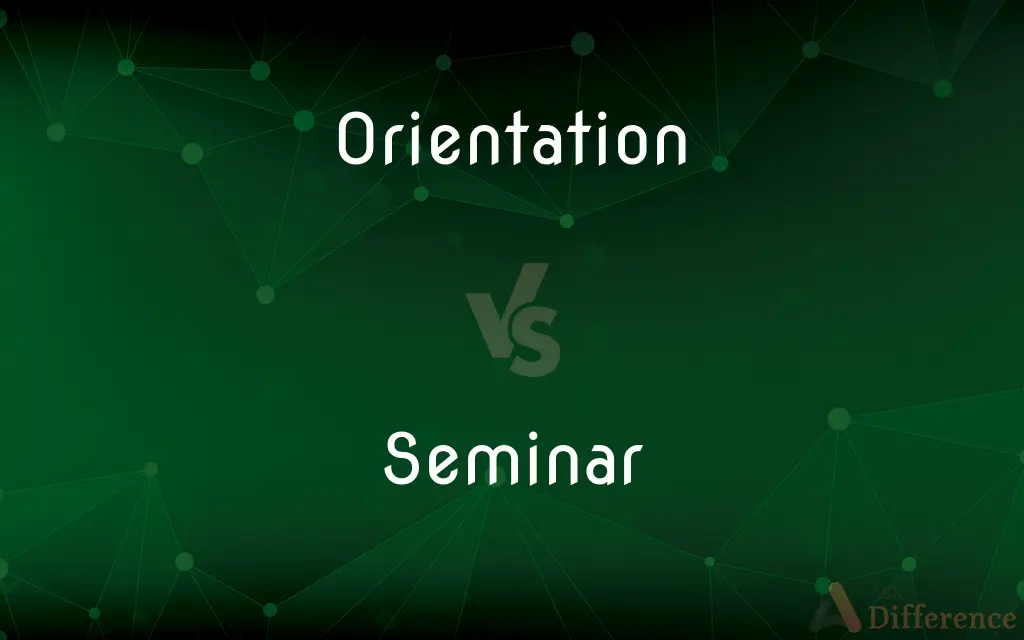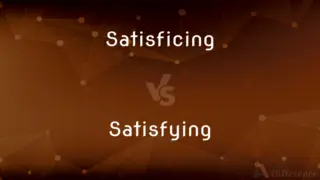Orientation vs. Seminar — What's the Difference?
By Tayyaba Rehman — Updated on October 22, 2023
Orientation introduces and familiarizes newcomers to an environment, while a seminar is a conference or meeting for discussion on a specific topic.

Difference Between Orientation and Seminar
Table of Contents
ADVERTISEMENT
Key Differences
Orientation is primarily designed to acquaint newcomers to a particular environment or system, ensuring they have the necessary knowledge to navigate and function efficiently. Seminars, on the other hand, are organized discussions or presentations centered around specific topics, intended for sharing knowledge or expertise.
Orientation programs often target individuals new to an institution, organization, or role, providing them with essential information, resources, and introductions. Seminars, by contrast, target a broader audience, which may include professionals, students, or enthusiasts seeking to deepen their understanding of a particular subject.
While orientation focuses on the foundational elements – the "what, where, and who" of a new setting – seminars delve into in-depth discussions, often involving experts presenting to an informed audience. Seminars often allow for dialogue, debate, and interaction among participants, enriching the learning experience.
Orientation's goal is to ensure a smooth transition, reduce initial anxiety, and increase comfort levels for participants in a new setting. Seminars aim to provide in-depth insights, promote dialogue, and enhance participants' knowledge on specific subjects.
Both orientation and seminar can be crucial in educational and professional settings. Orientation ensures individuals are well-equipped to begin their journey, be it in an academic institution, a new job, or a novel environment. Seminars, however, are about depth, exploration, and often, the development of professional or academic skills.
ADVERTISEMENT
Comparison Chart
Primary Purpose
To familiarize newcomers with a new environment or system.
To discuss or present on a specific topic.
Audience
Typically newcomers to an institution or role.
Professionals, students, or enthusiasts interested in a topic.
Interaction Level
High; involves introductions and foundational knowledge.
Varies; can be interactive or more lecture-based.
Duration
Can be longer, spanning days or even weeks.
Typically shorter, lasting a few hours to a day.
Depth of Content
Basic, introductory information.
In-depth, specialized information on a particular subject.
Compare with Definitions
Orientation
Orientation is the adjustment or positioning of something in relation to points on a compass or another specified direction.
The orientation of the building ensures maximum sunlight.
Seminar
A seminar is an academic course for advanced students, emphasizing discussion and student participation.
The literature seminar allowed students to dive deep into classical works.
Orientation
Orientation is the process of familiarizing oneself with a new situation or environment.
The job requires a two-day orientation to understand the company's procedures.
Seminar
A seminar is an event organized by professionals to discuss recent advancements in their field.
The tech company hosted a seminar on the future of artificial intelligence.
Orientation
The action of orienting someone or something relative to the points of a compass or other specified positions
Studies of locational awareness and orientation in young children
Seminar
A seminar is a conference or meeting on a specific subject, where information is exchanged.
The professor held a seminar on renewable energy solutions.
Orientation
A person's basic attitude, beliefs, or feelings in relation to a particular subject or issue
His book is well worth reading, regardless of your political orientation
Seminar
A seminar is a formal presentation or discussion, typically within an educational or professional context.
The seminar on financial planning was open to the public.
Orientation
Familiarization with something
Many judges give instructions to assist jury orientation
Seminar
A seminar is a form of academic instruction, either at an academic institution or offered by a commercial or professional organization. It has the function of bringing together small groups for recurring meetings, focusing each time on some particular subject, in which everyone present is requested to participate.
Orientation
The act of orienting or the state of being oriented.
Seminar
A course of study for a small group of students in a college or graduate school, often entailing research under the guidance of a professor.
Orientation
Location or position relative to the points of the compass.
Seminar
The group of students in such a course.
Orientation
The construction of a church so that its longitudinal axis has an east-west direction with the main altar usually at the eastern end.
Seminar
A scheduled meeting of such a group.
Orientation
The direction followed in the course of a trend, movement, or development.
Seminar
A meeting for an exchange of ideas; a conference.
Orientation
A tendency of thought; a general inclination
A Marxist orientation.
Seminar
A class held for advanced studies in which students meet regularly to discuss original research, under the guidance of a professor.
Orientation
An adjustment or adaptation to a new environment, situation, custom, or set of ideas.
Seminar
A meeting held for the exchange of useful information by members of a common business community.
Orientation
Introductory instruction concerning a new situation
Orientation for incoming students.
Seminar
A group of students engaged, under the guidance of an instructor, in original research in a particular line of study, and in the exposition of the results by theses, lectures, etc.; - formerly called also seminary, now seldom used in this sense.
Orientation
(Psychology) Awareness of the objective world in relation to one's self.
Seminar
Any meeting for an exchange of ideas
Orientation
(countable) The determination of the relative position of something or someone.
Seminar
A course offered for a small group of advanced students
Orientation
(countable) The relative physical position or direction of something.
Seminar
A seminar involves group discussions or lectures centered around a particular topic or theme.
The wellness seminar provided valuable insights into mental health and self-care.
Orientation
(uncountable) The construction of a Christian church to have its aisle in an east-west direction with the altar at the east end.
Orientation
(countable) An inclination, tendency or direction.
Orientation
(countable) The ability to orient, or the process of so doing.
The homing instinct in pigeons is an example of orientation.
Orientation
(countable) An adjustment to a new environment.
Orientation
(countable) An introduction to a (new) environment.
Orientation
(education) Events to orient new students at a school; events to help new students become familiar with a school.
Orientation
The direction of print across the page; landscape or portrait.
Orientation
The choice of which ordered bases are "positively" oriented and which are "negatively" oriented on a real vector space.
Orientation
The designation of a parametrised curve as "positively" or "negatively" oriented (or "nonorientable"); the analogous description of a surface or hypersurface.
Orientation
The act or process of orientating; determination of the points of the compass, or the east point, in taking bearings.
Orientation
The tendency of a revolving body, when suspended in a certain way, to bring the axis of rotation into parallelism with the earth's axis.
Orientation
An aspect or fronting to the east; especially (Arch.), the placing of a church so that the chancel, containing the altar toward which the congregation fronts in worship, will be on the east end.
Orientation
A return to first principles; an orderly arrangement.
The task of orientation undertaken in this chapter.
Orientation
The act of orienting
Orientation
An integrated set of attitudes and beliefs
Orientation
Position or alignment relative to points of the compass or other specific directions
Orientation
A person's awareness of self with regard to position and time and place and personal relationships
Orientation
A course introducing a new situation or environment
Orientation
Orientation is a program introducing newcomers to a new environment or role.
The university offers a week-long orientation for incoming freshmen.
Orientation
Orientation is the act of orienting or aligning relative to a reference point or system.
The artist's orientation of the sculptures creates an intriguing visual effect.
Common Curiosities
Can seminars be interactive?
Yes, seminars can be interactive, allowing participants to discuss, question, and engage with the presented content.
Is an orientation only for newcomers?
Primarily, yes; orientation is designed to help newcomers transition smoothly into a new setting or role.
Can orientation relate to direction or positioning?
Yes, in a different context, orientation can refer to the direction something faces or its alignment relative to points on a compass.
What is the primary purpose of an orientation?
Orientation aims to introduce and familiarize newcomers to a specific environment or system.
Does orientation only concern physical spaces?
No, orientation can also introduce organizational cultures, processes, or even abstract concepts.
Who typically attends seminars?
Seminars are attended by professionals, students, or enthusiasts seeking knowledge on a specific subject.
Why are seminars important in professional fields?
Seminars allow professionals to share knowledge, discuss recent advancements, and network with peers.
What's the difference between a seminar and a lecture?
While both are informative, seminars typically promote more discussion and interaction, whereas lectures are more one-sided presentations.
Do orientations always involve direct interaction?
While most orientations are interactive, some might involve self-guided materials or digital content for individuals to explore independently.
Can orientations last more than a day?
Yes, some orientations, like those for universities or large corporations, can span several days or even weeks.
Is a seminar formal or informal?
Seminars are generally formal but can vary in formality based on the topic and audience.
Is orientation limited to academic settings?
No, orientations can be held in various settings, including workplaces, organizations, or events.
Can a seminar be a regular academic course?
Yes, in academic settings, a seminar can be a course emphasizing discussion and student participation on advanced topics.
How long is a typical seminar?
Seminars can range from a few hours to an entire day, depending on the subject and format.
Share Your Discovery

Previous Comparison
Satisficing vs. Satisfying
Next Comparison
Dashiki vs. KaftanAuthor Spotlight
Written by
Tayyaba RehmanTayyaba Rehman is a distinguished writer, currently serving as a primary contributor to askdifference.com. As a researcher in semantics and etymology, Tayyaba's passion for the complexity of languages and their distinctions has found a perfect home on the platform. Tayyaba delves into the intricacies of language, distinguishing between commonly confused words and phrases, thereby providing clarity for readers worldwide.













































